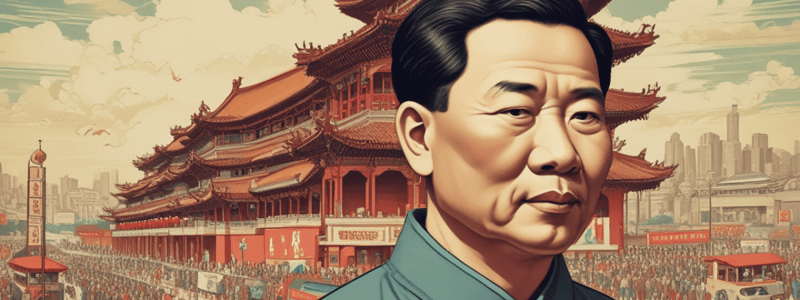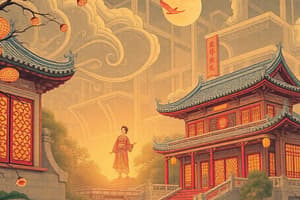Podcast
Questions and Answers
What did Deng Xiaoping call for after the death of Mao Zedong in 1976?
What did Deng Xiaoping call for after the death of Mao Zedong in 1976?
- A fifth modernization
- A new agricultural policy
- Four Modernizations (correct)
- The resignation of China's aging Communist Party leaders
What did the Chinese government do to improve the technological advances in the country?
What did the Chinese government do to improve the technological advances in the country?
- Sent thousands of students abroad to study (correct)
- Invited foreign investors to China
- Allowed women to take part in politics
- Ended the one-child policy
What was the result of the new agricultural policy in China?
What was the result of the new agricultural policy in China?
- The peasants paid rent to the collective
- The peasants owned the land
- The peasants were given free land
- The peasants could sell their produce for profit (correct)
What was the reaction of the Chinese government to the student protesters in 1989?
What was the reaction of the Chinese government to the student protesters in 1989?
What has been the result of the end of the one-child policy?
What has been the result of the end of the one-child policy?
Flashcards are hidden until you start studying
Study Notes
- After the death of Mao Zedong in 1976, Deng Xiaoping called for Four Modernizations, which included new policies in industry, agriculture, technology, and national defense.
- For more than 20 years, China had been isolated from the technological advances taking place elsewhere in the world, and the government invited foreign investors to China.
- The government also sent thousands of students abroad to study science, technology, and modern business techniques.
- A new agricultural policy began to lease land to peasants who paid rent to the collective. Anything produced above the value of the rent could be sold for profit.
- Poverty and underdevelopment began to end during the 1980s, and housing, education, and sanitation improved.
- Despite these achievements, many people complained that Deng Xiaoping’s program had not achieved a fifth modernization—democracy.
- In 1989, student protesters called for an end to the corruption and demanded the resignation of China’s aging Communist Party leaders. These demands received widespread support from people in the cities.
- Deng Xiaoping believed the protesters were calling for an end to Communist rule and ordered tanks and troops into the square to crush the demonstrators.
- Throughout the 1990s and into the 2000s, China’s human rights violations, its determination to unify with Taiwan, and its increasing military power created international concern.
- For now, a strong patriotism seems to be on the rise, encouraged by the government as a means of holding the country together.
- Problems remain for China, however, under the leadership of President Xi Jingping.
- After the death of Mao Zedong, the Chinese government began to allow women to take part in politics and gave them equal marital rights.
- After Mao's death, people had more freedom in everyday matters and had better living conditions.
- Married couples who had been given patriotic names chose more elegant names for their own children.
- Clothing choices were no longer restricted to a baggy "Mao suit."
- In contrast, today, young, wealthy Chinese purchase luxury brands from Europe and North America and wear the latest fashion.
- Because of these unintended consequences, Chinese officials announced the end of the one-child policy in 2015.
- Chinese families are now permitted to have two children instead of one.
Studying That Suits You
Use AI to generate personalized quizzes and flashcards to suit your learning preferences.



